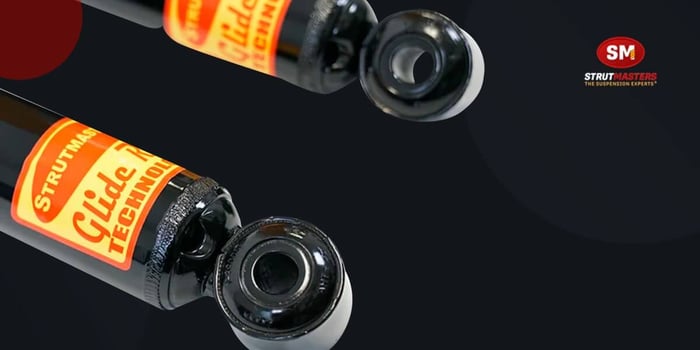If you're looking for replacement shocks for your car, you have two main categories to choose from: monotube shocks vs. twin-tube shocks. If you're having trouble deciding, you're not the only one. Without doing a whole lot of research on them, you might wonder what the difference is between the two. But more than that, you're probably wondering what the best type for your vehicle is.
Let's take a closer look at the differences between monotube and twin-tube shocks. Then, you can decide which type you should use to replace the shock absorbers in your vehicle. Here are a few things you should consider.
What Are Monotube Shocks?
Monotube shocks are a single tube with a floating piston that separates the gas chamber from the oil chamber. These shocks have a shell case that works as a cylinder that carries gas and oil. In monotube shocks, the shaft and piston move in the fluid area, and the piston valve is larger compared to twin-tube shocks.
In these shocks, the high-pressure gas chamber is separate from the fluid portion, providing an expansion area for excess fluid to move during compression. During aggressive movement, the piston pushes into the gas chamber, quickly increasing the gas pressure and providing additional damping force.
Pros of Monotube Shocks
Monotube shocks are growing in popularity because of the many benefits they provide, such as:
- Continuous and stable damping capacity due to greater heat dissipation and a larger oil capacity
- Oil releasing heat while exerting less effort as temperature increases
- Lack of air penetration in fluids because they are entirely separate
- Installation angles with no restrictions
- Complete efficiency through all temperatures
- Less likely cavitation
- Wider area of pressure due to a broader and bigger piston valve, resulting in a precise damping force
Cons of Monotube Shocks
Despite their many benefits, monotube shocks are not perfect, so consider these factors before deciding if they are suitable for your vehicle:
- Higher amounts of stress on seals due to high-pressurized gas
- Stiffer rides as a result of high-pressure gas injections
- More friction from moving parts
- External damage's direct impact on the inner cylinder
- Difficulty maintaining sufficient strokes as a result of the chamber positions
What Are Twin-Tube Shocks?
Twin-tube shocks have two cylinders, with a single cylinder sitting inside the shell case and another in the piston valve. In these shocks, there is no barrier to separate the chambers. The shaft and piston move up and down inside the working cylinder, and the base valve controls fluid movement, while the piston valves control most of the damping.
Pros of Twin-Tube Shocks
Twin-tube shocks offer many benefits that differ from monotube shocks. Pros of these shocks include:
- The design allows you to stop friction.
- You can attain sufficient strokes with less effort because the chambers are separate.
- The base valve ensures the gas pressure remains low.
- There is less stress on seals because gas pressure is low.
- The manufacturing cost is low.
Cons of Twin-Tube Shocks
Although twin-tube shocks offer many benefits for drivers, there are cons you must be aware of, such as:
- Installation can be difficult due to construction.
- Mounting is one-directional.
- The small pistons limit damping and are prone to heating.
- Performance can decrease exponentially if the fluids mix.
- The piston size is much smaller compared to monotube designs.
- Your oil capacity is reduced compared to monotube shocks.
- You can experience aeration if the chambers are not separated.

Monotube vs. Twin-Tube Shocks: How Do They Compare?
The difference between twin-tube and monotube shocks will help you decide which is the better choice. When you evaluate their capabilities and compare their performance, you can see a clear choice between the two. We've made it easy for you to decide which is better for your vehicle by providing a deep comparison between each. Here's how they both compare:
Ride Quality
Ride quality is usually the first consideration people make when deciding on which shocks to buy. One of the main functions of shock absorbers is to dampen the effects of dips and bumps in the road while you're driving. How they accomplish this task is one of the major differences between the two types of shock absorbers.
In monotube shocks, you've got one chamber that contains both hydraulic fluid and gas. The free-floating piston separates the fluids, ensuring they never mix. This provides stable, reliable support for your vehicle. Twin-tube shocks, on the other hand, work differently.
As their name suggests, twin-tube shocks have an inner and outer chamber. One contains hydraulic fluid and the other contains gas. Fluid flows between the chambers to dampen the ride when the shock is under pressure. However, if jolts in the road come at high speed or are especially violent, the fluid and the gas can mix. This can cause foaming and seriously impact your ride quality.
Responsiveness
Responsiveness is essentially a measurement of how well and how quickly your shocks adjust to road conditions. Ideally, your suspension should be gentle on smooth road surfaces and stiffen up on rougher terrain or high-performance situations. Twin-tube shocks get the job done by using several valves on their pistons that work independently of each other.
With a single-valve assembly, monotube shocks do the same job. In this case, it evenly distributes pressure over the entire shock, resulting in less stress in a particular area. In addition, monotube shocks usually have a larger circumference, which can help spread the load out even more. Since they act as one unit, monotube shocks generally offer better responsiveness than their twin-tube counterparts. This explains, in part, why many people decide to switch from twin-tube to monotube shocks.
Damping Stability
When the damping force is stable, you'll have a high-quality, responsive ride. This means the pressure in the shocks is distributed equally and evenly. Monotube shocks provide better damping than twin-tube shocks because of several aspects:
- Monotubes can spread pressure equally because they operate with a single valve. Twin-tubes, on the other hand, use multiple valves on one piston.
- Monotube pistons are typically much wider than the ones used in twin-tubes.
- The oil capacity in monotubes is much higher than that in dual-tube shocks. This also plays a big role in removing heat from the shocks.
- The free-floating piston valve never lets the hydraulic fluid mix with the gas, whereas this can easily happen in twin-tube shocks. This results in more precise damping.
Ease of Installation
When searching for performance shocks or struts, ease of installation is an important consideration. If you're installing them yourself, easier is always better. And if you're having them installed at a shop, an easier installation will save you tons of money on shop fees. This is one of the many reasons why monotube shocks are becoming more popular.
They have a single shell that is home to the piston valve, hydraulic fluid and pressurized gas. This means a much simpler and easier installation than their twin-tube counterparts, which require more effort and precision. Comparatively, even slight misalignments could throw off the damping performance of your twin-tube shocks.
Aeration
One of the biggest hindrances of shocks is aeration. Considering that the device contains oil and gas (oxygen or nitrogen), there is always the chance of the two products mixing. When this happens, the shock suffers the same effect as brake lines having air bubbles inside. This usually leads to poor damping and also fading, especially after a high performance or driving in rough sections.
Twin-tubes are more prone to aeration because of their design, where there is no separation of oil and gas. However, newer twin-tube shocks contain gases such as nitrogen which is more effective than oxygen. Monotube shocks have two chambers. The upper chamber contains the oil, while the lower one has the gas. A floating valve separates the two and minimizes the odds of the two mixing.
Fading
Fading commonly affects shocks and the overall suspension system. Accessory performance may wane if there is constant pressure on the shock. This may be caused by the liquid developing air bubbles, hence foaming, the pistons may become weak and allow some pressure to escape in between or the heat may cause the chamber to expand.
Fading is known to affect twin-tubes more than monotube shocks. This is because of several factors:
- The piston's surface area is much smaller.
- The shock has a smaller oil capacity.
- It is easy for the oil and gas to mix.
Monotube shocks have a larger surface area and carrying capacity. The higher amount of oil assists in dissipating heat much faster and lessens fading.
Monotube Shocks Are The Better Choice
Looking at the above comparison, monotube shocks have an edge over twin-tube shocks. Monotubes can be installed from different angles, are easier to install, offer better responses and don’t foam. Furthermore, the chance of aeration is quite minimal. Monotubes offer a better ride quality and have superior damping ability than twin-tubes.
Although monotube shocks are more of an investment than twin-tubes, the benefits that come with installing these shocks greatly outweigh the cost. In addition, monotubes offer more durability, require minimal maintenance and provide a lower long-run cost. Quality is key when it comes to buying shocks. Make sure to go for brands and companies that offer lifetime warranties. That means the company is confident in its products, and you can be too.
Shop Monotube Shocks From Strutmasters
Looking to replace the shocks on your car with robust, responsive monotube shocks? At Strutmasters, we combine precision engineering with high-quality components to offer you the best possible ride when replacing your shocks. We likely have a kit that's been engineered specifically for your vehicle. Just search for your make and model on our website.
If you still have questions or need help finding the right replacement for you, just call our Suspension Experts at 866-358-0127 and they'll be happy to help.





